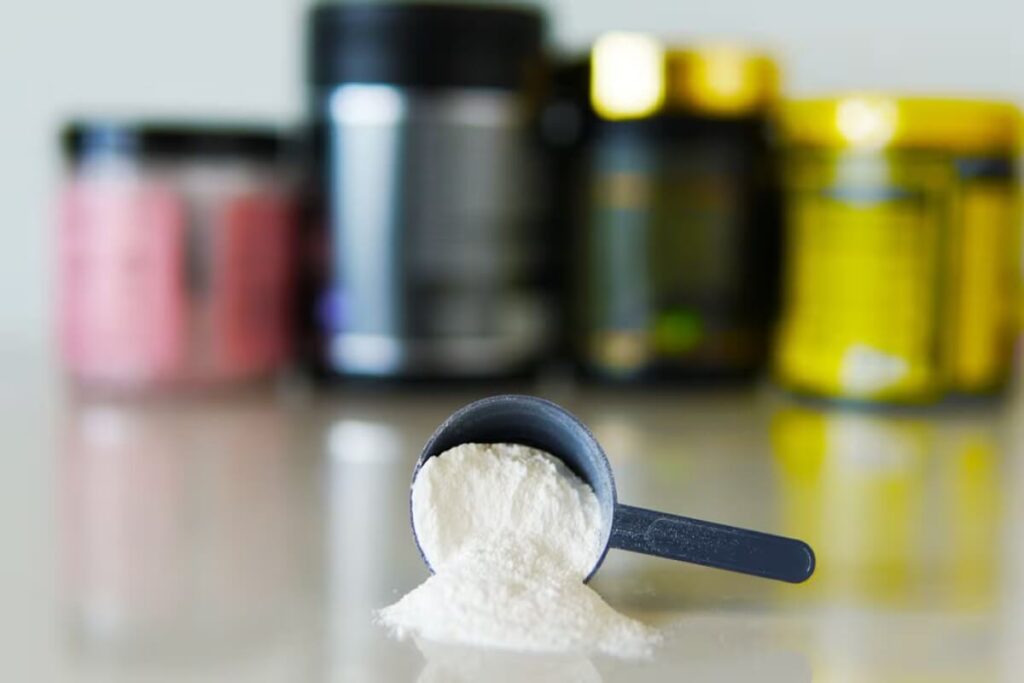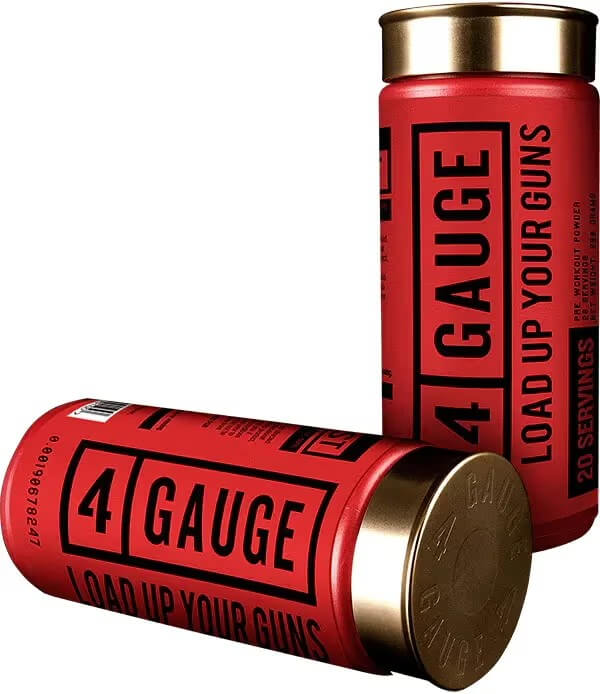How Many Scoops of Pre Workout to Use: More ≠ Better
Pre workout supplements can enhance performance during exercise. How many scoops of pre workout to use can be difficult to determine as scoop sizes and ingredients vary among products.
In this post, we discuss how to determine the right number of scoops based on your goals, the caffeine content of your pre workout, and provide tips for safe usage.
How many scoops of pre workoutto use depends on your goals and the caffeine content of your product. Try to determine the minimum effective dose. For example, start with less than 1 scoop and if after this you feel you need more, go up to 1 scoop and continue to gradually increase as needed.

What Is a Scoop of Pre Workout?
The size of a scoop of pre-workout can vary depending on the brand and specific product. However, a typical serving size for pre-workout supplements is between 5 and 20 grams per scoop.
It’s important to note that the recommended serving size can vary based on the individual’s body weight, tolerance to caffeine and other stimulants. It’s always best to follow the serving size guidelines provided by the specific product and consult with a healthcare professional before beginning any new supplement regimen.
The contents of the scoop can also vary, but commonly include ingredients such as caffeine, beta-alanine, creatine, and amino acids. Other ingredients that may be found in pre-workout supplements include taurine, tyrosine, and various herbal extracts.
Why Do Pre Workout Scoop Sizes Vary?
Pre workout scoop sizes can vary due to differences in the ingredients and dosages used in each product. Some pre-workout supplements are formulated with a high concentration of active ingredients, while others may contain more fillers or lower doses of key ingredients.

How Many Scoops of Pre Workout to Use?
General recommendations:
- Start with 1 scoop (or less) and gradually increase if needed.
- Pay attention to the caffeine content of your pre workout and avoid exceeding recommended daily limits.
- Drink adequate water throughout the day and during exercise.
- Take pre workout at least 30 minutes before exercise to allow time for absorption.
- Avoid taking pre workout late in the day to prevent interference with sleep.
These guidelines may not be appropriate for everyone. Always consult with a healthcare professional before starting any new supplement regimen.
1. For Various Goals
The appropriate number of pre-workout scoops to use can depend on your goals. However, specific recommendations on the number of scoops cannot be made due to the plethora of products on the market. A study that reviewed the common ingredient profile of the most popular pre-workout supplements found that the top three most prevalent ingredients were beta-alanine, caffeine, and citrulline.
Ingredient-Specific Dose Considerations Based on Goals:
Beta-alanine: 4–6g per day for at least 2-4 weeks has been shown to be effective for improved exercise endurance. The average amount listed in pre-workout formulations is about 1.2-2.8g per serving.
Caffeine: 200–300mg has been shown to improve vigilance, alertness, and mood required for optimal exercise performance. The average amount of caffeine listed in pre-workout formulations is about 175–335mg per serving.
Citrulline: 2.4–8g of L-citrulline or citrulline malate (both forms of citrulline are often combined together) has been shown to potentially indirectly increase nitric oxide production and therefore, exercise performance. However, the research is mixed. The average amount listed in pre-workout formulations is about 1.5–6.5g.

2. According to the Level of Caffeine in Pre Workout
The appropriate number of pre workout scoops to use can depend on the caffeine content of your product. It is important to pay attention to the amount of caffeine in your pre workout and avoid exceeding recommended daily limits. Here are some general guidelines based on caffeine content:
Dose 1: Less Than 100 MG per Scoop (Low Caffeine)
One scoop is typically sufficient for a boost in energy and focus.
Dose 2: 100-200 MG per Scoop (Moderate Caffeine)
Start with 1 scoop and consider increasing to 2 scoops if needed so long as the total daily dose does not exceed 400mg.
Dose 3: 200-300MG (Or More) Per Scoop (High Caffeine)
This should be approached with caution.
4 GAUGE Pre Workout Product
4 GAUGE is a pre workout supplement that is designed to help increase energy, focus, and endurance during workouts. It contains a blend of ingredients, including caffeine, L-Theanine, creatine, and L-Citrulline, which work together to provide a boost of energy, enhance mental clarity, and support muscle performance.
4 GAUGE comes in a powder form, with each scoop containing 150mg of caffeine, and is available in a range of flavors. It is recommended to take 1 scoop of 4 GAUGE around 20-30 minutes before a workout for maximum effectiveness.
FAQ
How Much Is a Scoop of Pre Workout?
The quantity of 1 scoop of pre workout can vary depending on the product and manufacturer. However, a standard scoop is typically between 5 and 20 grams of powder.
How Much Pre Workout Is Too Much?
It is essential to follow the recommended serving size for any pre workout product. Taking too much pre workout can result in negative side effects depending on the ingredients and dosages used.
Possible side effects include anxiety, jitters, insomnia, increased heart rate and blood pressure, headaches, and nausea. In extreme cases, it can lead to more severe health problems, such as heart palpitations and seizures. Always read the label and start with a smaller dose, gradually increasing as needed.
Conclusion
In summary, the appropriate number of pre workout scoops to use depends on your goals and the caffeine content of your product. Start with 1 scoop (or less) and gradually increase if needed, while paying attention to the caffeine content and avoiding exceeding recommended daily limits.
How much pre workout do you take? What other caffeine-containing products do you use and do you consider this when taking pre workout? Let us know in the comments below!
Also read:
- What to Mix With Pre Workout
- Does Pre Workout Have Calories
- Can You Take Pre Workout Without Working Out
- Does Pre Workout Break a Fast
- Pre Workout for Breastfeeding
- Pre Workout Side Effects
- Why Does Pre Workout Make You Itch
- Top Muscle Recovery Supplements
References:
- Spilling the Beans: How Much Caffeine is Too Much? // Fda: https://www.fda.gov/consumers/consumer-updates/spilling-beans-how-much-caffeine-too-much
- Common Ingredient Profiles of Multi-Ingredient Pre-Workout Supplements // Ncbi: https://www.ncbi.nlm.nih.gov/pmc/articles/PMC6413194/
- International society of sports nutrition position stand: Beta-Alanine // Ncbi: https://www.ncbi.nlm.nih.gov/pmc/articles/PMC4501114/
- International society of sports nutrition position stand: caffeine and exercise performance // Jissn: https://jissn.biomedcentral.com/articles/10.1186/s12970-020-00383-4
- ISSN exercise & sports nutrition review update: research & recommendations // Jissn: https://jissn.biomedcentral.com/articles/10.1186/s12970-018-0242-y
- The effects of L-theanine, caffeine and their combination on cognition and mood // Ponderapharma: https://ponderapharma.com/wp-content/uploads/2014/06/The-effects-of-l-theanine-caffeine-and-their-combination-on-cognition-and-mood.pdf
- Citrulline Malate Enhances Athletic Anaerobic Performance and Relieves Muscle Soreness // Journals: https://journals.lww.com/nsca-jscr/fulltext/2010/05000/citrulline_malate_enhances_athletic_anaerobic.9.aspx
- International Society of Sports Nutrition position stand: energy drinks // Jissn: https://jissn.biomedcentral.com/articles/10.1186/1550-2783-10-1
Why Trust Us?
With over 20 years in Olympic Weightlifting, our team does its best to provide the audience with ultimate support and meet the needs and requirements of advanced athletes and professional lifters, as well as people who strive to open new opportunities and develop their physical capabilities with us.
By trusting the recommendations of our certified experts in coaching, nutrition, dietology, and sports training programming, as well as scientific consultants, and physiotherapists, we provide you with thorough, well-considered, and scientifically proven content. All the information given in the articles concerning workout programming, separate exercises, and athletic performance, in general, is based on verified data. We ensure that you can rely on our professionals’ pieces of advice and recommendations that can be treated as personalized ones which will benefit you and fully meet your needs.
The product testing process is described in more detail here
Author: David Sasha Schulz
Doctor of Chiropractic, BSc Human Biology, CSCS
Strength coach (CSCS) – 10 years
Sasha is a Chiropractor and Kinesiologist practicing in Kelowna, BC, Canada. He has been practicing Chiropractic since 2019, integrating manual therapy, strength training and programming principles, and nutritional strategies to get his patients optimal results. He currently scratches the competitive itch in fitness, and the occasional endurance race, and plays golf and snowboards for fun. He has an interest in all strength and fitness-related sports.








